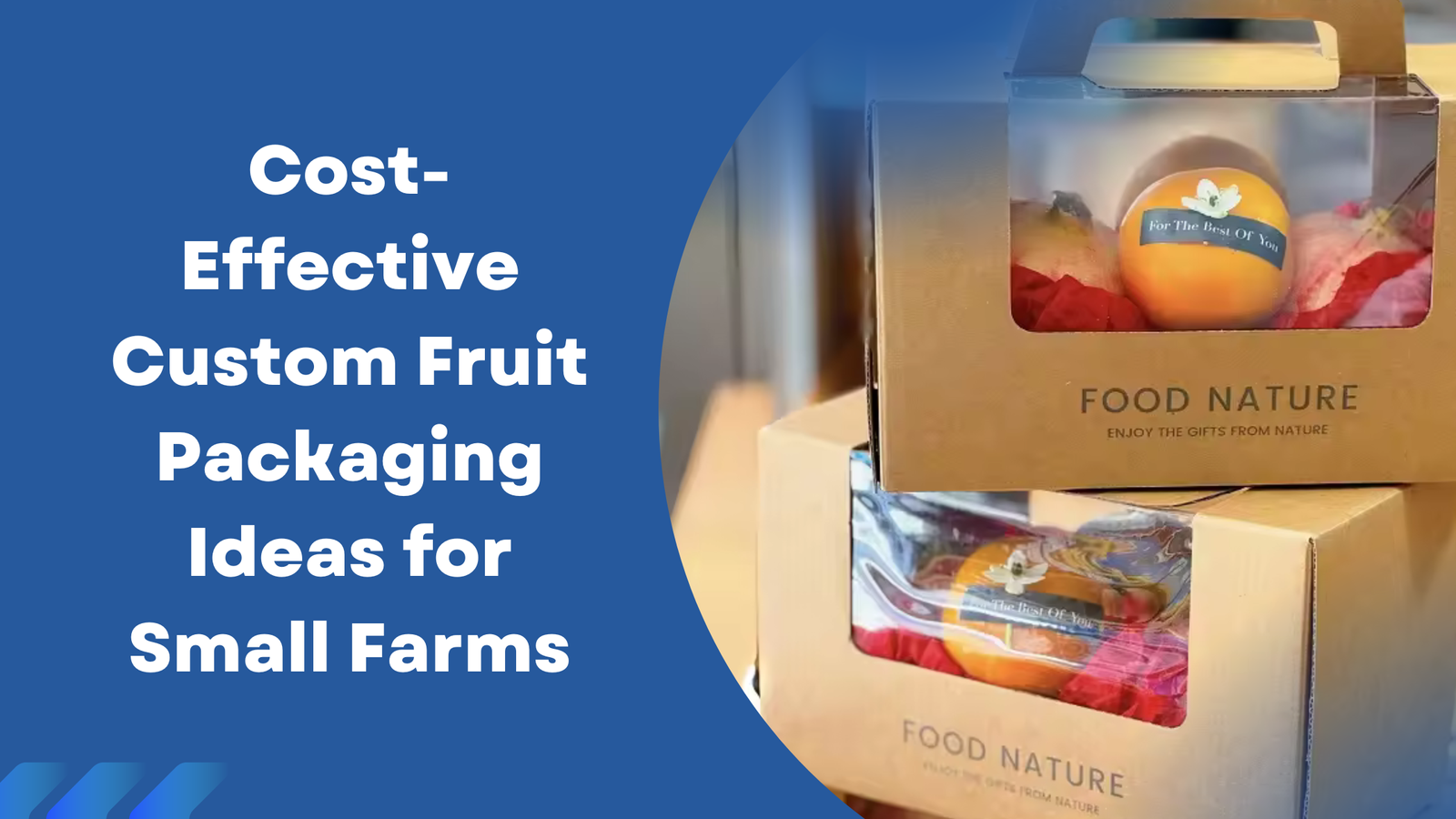Small farms face a unique challenge—delivering fresh, high-quality fruit while keeping packaging affordable. The right custom fruit packaging not only protects produce during transport but also enhances branding, boosts sales, and communicates freshness. Fortunately, you don’t need a big budget to create professional and attractive packaging. With smart material choices, thoughtful design, and efficient production methods, small farms can easily elevate their product presentation.
This guide explores cost-effective custom fruit boxes ideas that balance functionality, branding, and sustainability.
1. Why Custom Fruit Packaging Matters for Small Farms
Custom packaging helps small farms stand out in today’s competitive market. Whether you sell at farmers’ markets, grocery stores, or online, the packaging is often the first interaction customers have with your brand.
Key benefits of custom fruit packaging include:
- Better protection: Prevents bruising and keeps fruit fresh.
- Brand recognition: Consistent colors, logos, and labels enhance recall.
- Higher perceived value: Attractive packaging makes produce look premium.
- More sales: Eye-catching designs attract attention on shelves and at markets.
- Sustainability options: Eco-friendly packaging appeals to modern buyers.
2. Use Affordable and Eco-Friendly Materials
Choosing the right material is the biggest factor in reducing packaging costs. Fortunately, there are several budget-friendly options that still look professional.
Best cost-effective materials include:
• Kraft Paper Boxes
- Biodegradable
- Rustic, natural appearance
- Highly affordable
Perfect for: Apples, berries, grapes, peaches, citrus fruits.
• Corrugated Cardboard Trays
- Durable yet inexpensive
- Ideal for transporting bulk fruit
- Customizable with simple printing
Perfect for: Farm-to-retail delivery, wholesale distribution.
• Pulp Fiber Trays
- Made from recycled paper
- Provides cushion and airflow
- Cost-effective for delicate fruits
Perfect for: Berries, cherries, plums.
• Poly Bags with Custom Labels
- Low-cost
- Lightweight
- Good for pre-portioned produce
Perfect for: Grapes, oranges, mixed fruit packs.
3. Smart Design Tips to Reduce Costs Even More
Even with custom packaging, small farms can save money using strategic design choices.
✔ Use Minimalist Printing
Full-color printing is beautiful but expensive. Instead:
- Choose 1–2 color printing
- Use bold typography
- Incorporate your logo as a simple outline
This keeps branding strong without high printing costs.
✔ Choose Standard Sizes
Custom die-cut sizes increase production expenses.
Using standard-sized boxes:
- Cuts costs
- Speeds up production
- Reduces material wastage
✔ Opt for Stickers Instead of Printed Boxes
Instead of printing directly on the box:
- Print affordable branded stickers
- Apply them to plain kraft or white boxes
You can easily update branding or use seasonal designs.
✔ Use Window Cutouts
A die-cut window helps customers see the fruit inside, increasing trust and appeal.
4. Creative and Cost-Effective Packaging Ideas Small Farms Can Try
Here are some practical, budget-friendly ideas that look great and protect your fruit effectively.
1. Kraft Fruit Boxes with Clear Windows
These boxes are perfect for berries, apples, or mixed fruit gift sets.
They look rustic, natural, and premium without costing much.
2. Recycled Cardboard Carry Caddies
Ideal for small fruits like cherries or mini apples.
They come with handles, making them convenient for markets.
3. Custom Printed Fruit Sleeves
These cardboard sleeves wrap around standard fruit containers, offering:
- Branding
- Nutrition details
- QR codes
- Harvest information
Very affordable and easy to produce.
4. Fruit Trays with Branding Stickers
Use corrugated or pulp trays and add a custom logo label.
This is one of the cheapest branding methods.
5. Mesh Produce Bags
Lightweight and breathable, great for selling:
- Oranges
- Lemons
- Apples
- Avocados
Add a branded hang tag for a professional touch.
6. Farm Story Cards
Include a small printed story card inside the packaging.
Tell customers:
- Who grew their fruit
- Where it came from
- Why your farm focuses on quality
This builds trust and emotional connection.
5. Packaging for Transport and Delivery
Small farms often handle their own deliveries, so protective packaging is essential.
Top protective features to consider:
- Ventilation holes to keep fruit fresh
- Reinforced corners for stability
- Pulp dividers to prevent bruising
- Moisture-resistant coatings for longer shelf life
These cost only a little extra but significantly reduce product loss.
6. Branding Ideas to Make Your Fruit Packaging Stand Out
Even on a small budget, your packaging can look premium.
Branding tips:
- Use warm, natural colors (greens, browns, earthy tones)
- Add your farm’s logo on stickers or stamps
- Include QR codes leading to recipes, farm tours, or social media
- Use hand-drawn illustrations (low-cost, charming, unique)
- Add “Freshly Harvested” or “Farm to Table” badges
These small touches create a premium experience.
7. Where Small Farms Can Get Affordable Custom Fruit Packaging
Many packaging suppliers offer low minimum order quantities, perfect for small farms.
Look for providers that offer:
- Kraft and corrugated fruit boxes
- Custom stickers and labels
- Pulp trays
- Eco-friendly packaging
- Bulk discounts
- Free design services
Always ask suppliers about:
- MOQ options
- Seasonal discounts
- Material alternatives
- Digital printing (cheaper than offset for small runs)
Conclusion
Custom fruit packaging doesn’t have to be expensive. With the right materials, smart design choices, and a focus on sustainability, small farms can create packaging that protects produce, increases sales, and enhances brand recognition—all while staying on budget.
Whether you use kraft boxes, pulp trays, stickers, or mesh bags, the goal is to present your fruit in a way that reflects freshness, quality, and care. Small upgrades can make a big difference in how customers perceive your brand.


